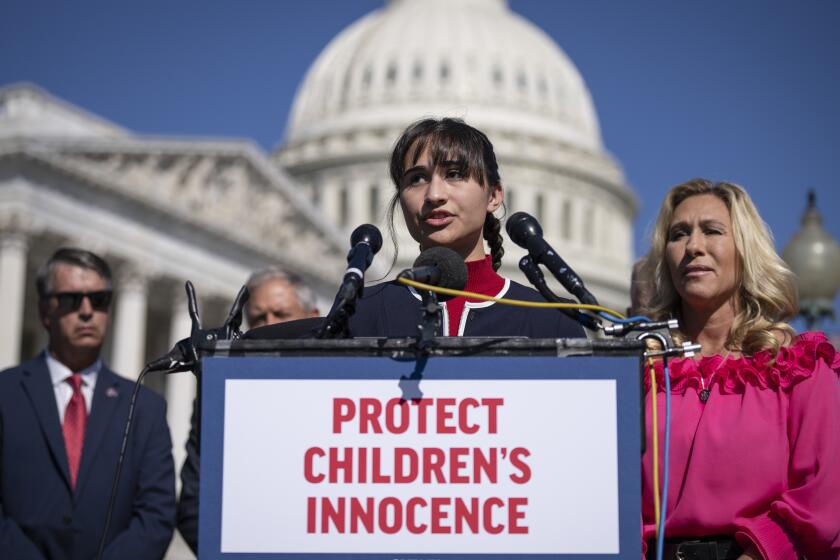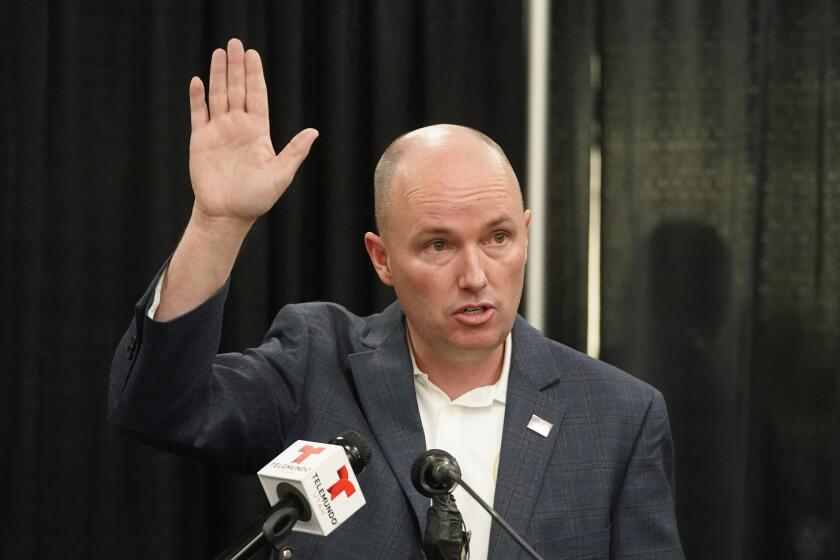California’s transgender sanctuary law survives a challenge as judge ridicules plaintiff’s claims

- Share via
In 2022, when legislation outlawing gender-affirming medical treatments erupted in mostly red-state legislatures across the land, California enacted a law creating a sanctuary for those whose treatments were blocked by the lawmakers.
SB 107, which was signed into law by Gov. Gavin Newsom that September, provided a safe harbor for people from those states who sought the treatment in California, where it’s legal.
The law prohibited the release of medical information about a patient if it was sought from a state that made the treatments illegal, and forbade the arrest or extradition of medical providers in California if the request came from authorities in states that had criminalized the treatments.
Our Watch firmly believes that transgenderism is a cultural issue that it must deal with in accordance with God’s design for every child, as outlined in the Bible.
— Our Watch vs. Bonta
Unsurprisingly, SB 107 became the target of right-wing, anti-LGBTQ+ activists in California. On Tuesday, U.S. District Judge Dale A. Drozd of Sacramento dismissed an effort to declare the law unconstitutional.
It was the third attempt by the plaintiff, a nonprofit affiliated with a conservative Christian church in Temecula that says its mission is to “restore Christian-Judeo values in government and education,” to win Drozd’s approval for its lawsuit. This time, Drozd, plainly fed up with the plaintiff’s serial inability to make its case, forbade it to try again because any further filing would be, as he wrote, “futile under the circumstances.”
Get the latest from Michael Hiltzik
Commentary on economics and more from a Pulitzer Prize winner.
You may occasionally receive promotional content from the Los Angeles Times.
Whether Drozd’s ruling will hold up under appeal or whether the law itself can survive other lawsuits to overturn it is impossible to say. But the lawsuit filed last year by the nonprofit Our Watch with Tim Thompson (he’s the pastor of the Temecula church) is nevertheless instructive. Our Watch was represented in court by lawyers affiliated with Advocates for Faith and Freedom, a Murrieta organization that lists “parental rights” and “the rights of children, both born and unborn,” among its concerns.
The lawsuit opens a window on the lengths to which zealots and fanatics will go to interfere with the activities of others because they conflict with their own narrow ideologies. There’s a polite name for them: “busybodies.”
The case also underscores how our personal rights are perched on a judicial knife edge in today’s America. There’s ample reason to believe that if such a case were to land in front of a Trump-appointed judge — U.S. Judge Matthew Kacsmaryk of Amarillo, Texas, for instance — the law would have been invalidated in a heartbeat. Appeal would have been taken to the Trump-infested 5th Circuit Court of Appeals, and perhaps ultimately to the Supreme Court, where its fate might be sealed.
A transgender patient says Kaiser forced her to transition from male to female. Here’s what that’s really about.
After all, that’s been the arc of Kacsmaryk’s ruling invalidating the Food and Drug Administration’s approval of the abortion drug mifepristone. In that case, Kacsmaryk and the 5th Circuit judges bought into the plaintiffs’ fanciful assertions that, as doctors, the prospect of medication abortions caused them “mental and emotional stress”; appeals judge James C. Ho rationalized upholding Kacsmaryk’s mifepristone ban by commenting, “Doctors delight in working with their unborn patients — and experience an aesthetic injury when they are aborted.”
That didn’t happen here because Drozd, an Obama appointee, can recognize a factitious claim for standing when it swims into his ken.
I’ve written before that transgender individuals have become the prime targets for discriminatory legislation in part because socially acceptable targets for hate-mongering and prejudice have become harder for conservative culture warriors to find.
As I observed in 2018, open racism is out (though it made a strong comeback in the Trump era and in the hands of commentators such as Tucker Carlson). In an increasingly pluralistic society, legislators who denigrated ethnic or religious minorities or those with mental illnesses or disabilities found themselves on the outs.
Gay and lesbian Americans have moved into the cultural and social mainstream. Many conservative families have found themselves embracing gay and lesbian siblings, children and parents as worthy of familial love and respect. Same-sex marriage has become embedded in the entertainment mainstream, portrayed on popular TV programs without apology.
Moreover, gay and lesbian people acquired a voice in the highest echelons of political power; gay-bashing no longer works for a political candidate as it has in the past, except perhaps in the most benighted corners of American society.
That leaves gender transition, which is easily caricatured and demonized by unscrupulous politicians aiming to rally their base against a wholly imaginary crisis. By early 2022, according to Human Rights Watch, 130 bills had been introduced in state legislatures. Many barred transgender youths from playing on sports teams or using bathrooms other than those designated for their birth gender.
As of this year, 23 states have banned or restricted gender-affirming treatments for youths; some carry prison terms for violations or restrict insurance coverage. In Florida, parents who allow such treatments for their children can lose custody; in Texas, they can be investigated for child abuse. Florida, Ohio and Missouri have implemented restrictions even on gender transition treatments for adults. A Florida rule barring Medicaid coverage for gender treatments was blocked by a federal judge, whose ruling is under appeal.
This is the environment that prompted California to enact its sanctuary law. Its law resembled the state’s effort to become a sanctuary for women seeking abortions that their home states had rendered illegal in the wake of the Supreme Court’s overturning of Roe vs. Wade in 2022.
Utah Gov. Cox stood firm against anti-transgender legislation last year. What made him sign a much harsher law this week?
The plaintiff in this case left no question that its action was grounded in fundamentalist anti-transgender bias. “Our Watch firmly believes that transgenderism is a cultural issue that it must deal with in accordance with God’s design for every child, as outlined in the Bible,” the lawsuit says.
As so often occurs, the plaintiff’s case against the California law is a melange of misdirection and misrepresentations.
Our Watch positioned its lawsuit as an effort to protect the right “of parents to raise their children” without governmental interference. It depicted SB 107 as a law that “allows minors to obtain gender transition procedures like harmful puberty blockers, cross-sex hormones, and irreversible surgeries without parental consent, while denying parents access to their child’s medical information.”
This is a flatly inaccurate characterization of the law. It also turns the law’s goal on its head.
The truth is, as Atty. Gen. Rob Bonta observed in his response to the lawsuit, California law gives parents the right to access their children’s medical records. “Nothing in SB 107 changes that,” he noted. Further, he wrote, all those procedures listed in the lawsuit “generally require parental consent in California” — another regulation unaffected by SB 107.
The whole purpose of the California law, Bonta wrote, was to give parents of children seeking gender-affirming care refuge from out-of-state laws that interfered with their right to obtain medically indicated care for their children — not to allow such care over parents’ objections.
The lawsuit painted a picture of physicians willy-nilly imposing radical, irreversible gender-affirming treatments on innocent adolescents whose “gender dysphoria” (the medical term for gender uncertainties) might be transient and resolve itself over time or with counseling.
That’s a caricature of the standard of care for gender dysphoria as it’s implemented by physicians following established protocols. The truth is that “prior to the onset of puberty, kids typically receive non-medical care,” Boston University psychologist Melissa K. Holt explained during a roundtable discussion of care for youths in 2022.
Now Florida Gov. DeSantis wants to strip medical care from transgender children and adults.
Care for prepubescent children, Holt said, “is focused around social transitioning,” such as choosing a new name and adopting different dress, “and providing mental health and structural support, like schools using a child’s preferred gender pronouns and allowing them to use the bathroom that aligns with their gender identity.... There are no 4-year-olds going through irreversible medical procedures.”
Drugs such as puberty blockers and hormone treatments are typically administered only as children move into adolescence, are viewed as safe, and are expected to be used only after discussions with medical providers. Medical protocols discourage gender reassignment surgery before the age of 18. But professionals in the field say that outlawing such treatments or even counseling for younger children can produce long-standing psychological problems.
Much of the lawsuit’s argument was self-refuting. “Parents, not the government, are best suited to decide” on their child’s medical treatment, the lawsuit says. Exactly; so how do SB 107’s opponents explain state laws that allow the government to impose its judgment over the parents? The lawsuit is silent on that question.
In dismissing the case, Drozd didn’t address those issues because he found that the lawsuit had a more fundamental shortcoming: The plaintiff didn’t have standing to bring the case at all.
“Standing” is a concept derived from the U.S. Constitution, which holds, roughly, that litigants in federal court must show that they’re directly harmed by a government action and that their lawsuit will remedy the injury. Our Watch couldn’t meet that requirement, Drozd ruled.
Our Watch claimed that it was “directly harmed” by SB 107 because the law prompted it to “divert our attention to transgender issues” rather than “tackling major cultural issues that violate Christian-Judeo values, including the sexual indoctrination of children, ... critical race theory, and abortion.” (Not to be churlish, but some people might be relieved that SB 107 narrowed the organization’s involvement in such overheated culture wars.)
Our Watch “plans to expend money on conferences to connect key stakeholders who are also fighting against the devastating effects of SB 107,” the lawsuit stated.
It wasn’t hard for the judge to see through this argument. Plaintiffs can’t “manufacture standing” through their own choices, he ruled: Our Watch’s “decision to place more focus and correspondingly commit more of its resources to ‘transgender issues’ ... was a voluntary decision — not a forced one.”
The culture wars over gender issues are sure to continue because they rely on public ignorance and prejudice — always the preferred weaponry of demagogues. The lawsuit to overturn California’s sanctuary law had, at its core, nothing to do with protecting children. If it did, its promoters wouldn’t have had to gin up a cause of action where none existed.
More to Read
Get the latest from Michael Hiltzik
Commentary on economics and more from a Pulitzer Prize winner.
You may occasionally receive promotional content from the Los Angeles Times.














